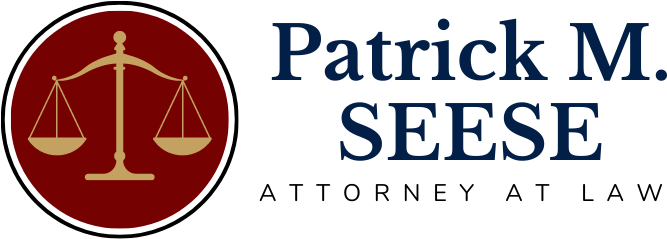FAQs
Patrick M. Seese Attorney at Law
Have a bankruptcy-related question? We have the answer. Check out these FAQs and give us a call today for more information!
-
What is bankruptcy?
Bankruptcy is a legal process that allows individuals or businesses (debtors) who owe others (creditors) more money than they're able to pay to either work out a plan to repay the money over time or to completely eliminate (discharge) most of the bills.
-
Which bankruptcy type or chapter should I file?
Consumers typically file either a Chapter 13 bankruptcy where repayment is made to creditors or a Chapter 7 bankruptcy where the debts are discharged. The type depends on your circumstances and whether you have assets available to repay all or part of your debts. Bankruptcy laws can be tricky and involved, so determining if, when, and which type of bankruptcy you need should be made with careful thought or the input of a bankruptcy lawyer.
-
What do I need to begin the bankruptcy process?
Compile a list of past and present debts as well as a schedule or list of assets and liabilities. You will also need to provide my office with certain additional information such as pay stubs, tax returns, etc.
-
Does my divorce decree protect me from creditors if my ex files for bankruptcy?
No. If you're a co-signer with your ex-spouse on a debt, the creditor can require the entire payment of that debt from you even though the divorce decree assigns the full debt to your ex-spouse. Your divorce decree may address any recourse you may have against your ex-spouse should he or she default on the loan obligations.
-
Can a loan co-signer be responsible for a debt if the other person files for bankruptcy?
Yes. The lender can require the co-signer to make payments on a loan once the principal has declared bankruptcy on the credit. This makes it extremely important when considering co-signing a loan: be ready and able to pay the loan in the event that the principal signer defaults.
-
Can all types of debt be discharged?
No. The debts that can't be discharged vary slightly between the different chapters of bankruptcy. Generally, the following types of debts cannot be discharged:
- Debts for taxes owed to local, state, or federal agencies, unless you meet certain qualifications
- Debts for money, property, or services that were obtained fraudulently
- Debts owed to a spouse, former spouse, or child, for alimony, maintenance, or support of a spouse or child
- Debts for most types of educational loans
- Debts for death or personal injury caused by the debtor's drunk driving or from driving while under the influence of drugs
- Debts incurred after a bankruptcy was filed
-
Will I have to surrender all of my assets if I file for bankruptcy?
In most bankruptcies, assets such as your house, vehicle, furniture, retirement plan, etc. can be protected. However, it is extremely important that we discuss your assets in detail because proper planning can mean the difference between keeping or losing an asset.
-
Do I have to file bankruptcy on all debts I owe or can I keep some?
You must include all the debts you owe in your petition and schedules. You may decide to keep some debts by "reaffirming" the specific debt.
-
How long does a bankruptcy stay on my record?
Bankruptcies remain on credit reports anywhere from 7 up to 10 years.
-
Can I do anything to remove bankruptcy from my credit report?
No. Although as your option, you can file an explanation with the credit reporting agencies briefly describing the events resulting in your bankruptcy. If an account is reported inaccurately, you can request the record be updated to reflect the actual situation.
-
When can I apply for credit again?
The decision whether to grant you credit in the future is strictly up to the creditor and varies from creditor to creditor. There's no law that prevents anyone from extending credit to you immediately after the filing of a bankruptcy, but creditors aren't required to extend you credit.
-
What happens at a 341 meeting of creditors?
Approximately 30 days after you file bankruptcy, you must attend a short meeting with the bankruptcy trustee who is assigned to your case. Mr. Seese will attend the meeting with you. Although this meeting is called a "Meeting of Creditors," in most cases, there will be no creditors present at the meeting. Mr. Seese will prepare you ahead of time for what to expect at this meeting.
-
Can I add a debt to my bankruptcy schedule if it was initially forgotten?
After filing the petition, if you discover that an entry is inaccurate or missing, you may typically file an amendment to correct it.
-
When should I stop using my credit cards if I'm planning on filing for bankruptcy?
As soon as you anticipate or even consider filing bankruptcy, stop using your credit cards! Bankruptcy law allows creditors to review questionable purchases for potential fraud.
-
What's a reaffirmation agreement?
Reaffirming a debt is voluntary and isn't required by bankruptcy codes. You may voluntarily repay any debt instead of signing a reaffirmation agreement, but there may be other reasons for wanting to reaffirm a specific debt, such as a vehicle or a home loan.
-
Can my creditors obtain liens against my property?
In some cases, yes, if a creditor sues you and receives a judgment against you, it is quite possible that they may also have a lien against your house. However, the bankruptcy court can often order that such judgment liens be removed or avoided.
Business Hours
- Mon - Fri
- -
- Sat - Sun
- Closed
Weekend & Evening Appointments
We are a debt relief agency. We help people file for bankruptcy relief under the Bankruptcy Code.

Share On: